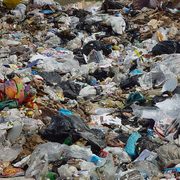-
Hello from the Sustainability Office, and happy spring! After an eventful Earth Week and a sad farewell to Alex Miller, our waste, food, outreach, data and energy, and policy and…
-
Did the Superbowl bring out some football season nostalgia? Learn more about the waste contamination prevention efforts that were going on during Carleton’s home games!
If you’re a Carleton football fan, you may have noticed a few changes in Laird Stadium this fall. The tailgating area got a new triple bin, and each of the existing triple bins got a student or two (nicknamed “trash talkers” ) stationed nearby to answer questions about Carleton’s waste sorting system. Rob Nechanicky, our Custodial Services Supervisor shared some thoughts on our newest moves toward Zero Waste Athletics.
-
People often assume that composting is this impactless way of returning unlimited amounts of food waste to the earth and restarting the cycle — or that it’s impossible to produce too much waste as long as it’s compostable. This is not accurate. Facilities like this one can handle large volumes of waste, but it is currently running at capacity. Compost is a great option, but any kind of waste management is going to have an impact on the ecosystem.
-
Waste audit done on Facilities Deparment
-
The Custodial Waste Busters visit a recycling center and composting facility to learn more about where Carleton’s waste goes and how it’s handled once it leaves campus.
-
A visit to the Rice County Landfill and an opportunity to think about all the waste we generate.
-
A new waste reduction program in Carleton’s dining halls
-
Orion Martin ’11 writes to us as he is volunteer teaching in the city of Yangon, Myanmar! Yangon has no regular garbage removal service. Without garbage trucks and large street cleaning machines to quickly whisk away garbage, residents of Yangon must ‘live with their garbage’. Most American communities are able to ‘hide’ their garbage in massive landfills. Orion has found that the people of Yangon have a more realistic understanding of the garbage they create than most Americans.
-
(Note: John Kraus has updated his February article about Trayless Dining at Carleton, and the updated version has been reposted here.)
According to Food for Thought (A Carleton student group), the Carleton dining halls produce about 2,700 pounds of food waste per day. Colleges, in an attempt to reduce waste and save money, have experimented with various ways to reduce food waste. Going to tray-less dining has generally shown a reduction in food waste of 25-30%; Hamline College recently implemented this step and expects to save $25,000 a year. In the following article John Kraus (’10) outlines a well researched case for trayless dining at Carleton.
-
For my Buddhism and Ecology class at Carleton, I recently went on a field trip to see the Rice County Solid Waste Facility. The facility, which consists of a landfill, recycling center, and hazardous waste center, is where Carleton ships all of its leftovers once compost and recyclables are removed. In the spirit of understanding the consequences of our actions, we headed out in vans to see for ourselves where our trash is kept. The facility sits on 320-340 acres of land located next to the Cannon Valley Wilderness Area near Faribault, MN. The large mounds of uncapped trash attract lots of wildlife including eagles, turkey buzzards, deer, coyotes, and hawks. Because decomposition in a landfill is so slow, there are always items of food for animals to pick over at the site. To give us a sense of the timescale for decomposition, an employee showed us newspaper clippings from the 1970s which had been pulled out of one of the trash cells. Despite having been in the landfill for almost 40 years, the newspaper was in mint condition, only slightly yellow in color. Newspapers are a good indicator of how fast trash items are breaking down because they decompose more rapidly than most trash items, especially plastics.
As we sat and watched large bulldozers crush the trash to reduce air space, we discussed the challenges they encounter at the facility in processing Carleton’s trash. I was surprised to hear the response.
Categories
- Building and Planning
- Carleton's Wind Turbines
- Climate Change
- Conferences
- Cowling Arboretum
- Ecosystem Management
- Emissions and Offsets
- Energy Sources & Uses
- Environmental Justice
- Events
- Food
- Higher Education
- International News
- National News
- News
- STA Program
- Student Life
- Student Projects
- Sustainability
- Sustainable Planning & Development
- Transportation
- Waste


